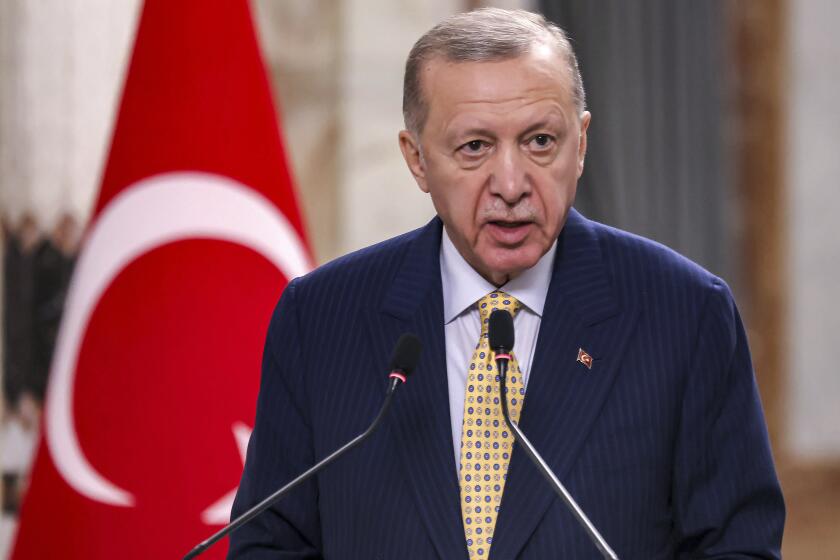Ex-NYPD Official to Replace Ridge
President Bush will name Bernard Kerik, a plain-spoken career law enforcement officer who was New York City’s police commissioner during the Sept. 11 attacks, as secretary of the Department of Homeland Security, senior administration officials said Thursday.
Kerik, 49, who spent 4 1/2 months in Iraq last year to rebuild a police force, would take over a department created less than two years ago to keep Americans safe from the threat of terrorist attacks. He would replace Tom Ridge, the first head of the department, who announced his resignation Tuesday.
The announcement of Kerik’s nomination is expected today.
Also Thursday, Bush nominated Mike Johanns, a two-term Republican governor of Nebraska, as secretary of Agriculture. If confirmed by the Senate, Johanns, 54, would succeed Ann M. Veneman, a Californian.
Bush first met Johanns, the son of a dairy farmer, while governor of Texas. Johanns, a onetime Democrat and a former mayor of Lincoln, Neb., was elected to his current post in 1998 and reelected in 2002.
In addition, the U.S. ambassador to the United Nations, John C. Danforth, announced Thursday that he had submitted his resignation last month. A former Republican senator from Missouri, Danforth had served at the U.N. since the end of June.
In his Nov. 22 letter to Bush, Danforth, 68, cited his desire to return to private life but said he would remain available for short-term assignments. Before taking the U.N. post, he had served as Bush’s special representative for peace in Sudan.
Since Bush’s reelection a month ago, seven of his 15 Cabinet secretaries -- of the departments of State, Justice, Energy, Commerce, Agriculture, Education and Homeland Security -- have announced that they are leaving the administration. The White House has already named replacements for five of the positions.
More departures are expected in the coming days and weeks, administration officials said.
An acknowledged troublemaker in his youth -- he dropped out of high school and got a young woman pregnant shortly after arriving in South Korea with the Army -- Kerik has a reputation as a forceful leader who gets positive results.
If confirmed by the Senate, he would face the challenge of trying to defend against the possibility of another terrorist attack while seeking to finish the job of putting together the sprawling department, whose 180,000 employees were assembled from 22 agencies with vastly different missions.
Supporters of Kerik who watched him lead the New York Police Department through the attacks on the World Trade Center said he was up to the job.
“He has always been a very strong leader,” said Patrick J. Lynch, president of the New York City Patrolmen’s Benevolent Assn., the police union. “He understands security needs, especially in response to terrorism.”
Sen. Charles E. Schumer (D-N.Y.) said in a statement that Kerik knew “the great needs and challenges this country faces in homeland security.”
“He has a strong law enforcement background, and I believe will do an excellent job in fighting for the resources and focus that homeland security needs and deserves in our post-9/11 world,” Schumer said.
Administration officials said Kerik’s success in leading the police department during the city’s most difficult weeks proved his qualifications to head Homeland Security.
“If you can run the New York City police department, you know how to do things,” said one senior administration official, who did not want to be identified before an official announcement.
Kerik was police chief under Mayor Rudolph W. Giuliani, and works closely with his former boss at Giuliani Partners, a strategic consulting firm in New York. Some administration officials said a Kerik nomination would reflect Giuliani’s influence.
“Giuliani is cashing in chits,” an administration official said.
Other contenders for the post -- such as Asa Hutchinson, the department’s undersecretary for border and transportation security -- have more experience with the Washington bureaucracy and with Congress, qualifications many observers said would be necessary to manage the department’s varied and sometimes conflicting parts.
But Kerik has shown he has one of the most important qualifications for a Cabinet position in the Bush administration: loyalty to the president.
At the Republican National Convention this summer, Kerik praised Bush’s leadership during and after the Sept. 11 crisis, saying, “We live in a much safer world as a result of this president’s strong leadership.”
When Kerik returned from Iraq last year, Bush thanked him for showing up “at times of chaos and confusion.”
“Because of his leadership, his knowledge and his experience, he was able to stand up a police force in Baghdad in a very quick period of time,” Bush said.
The training programs Kerik launched increased the Iraqi police force from about 30,000 when he arrived to more than 80,000 in late 2003, but his successors cut the force to about 46,000 this year by weeding out corrupt and ill-trained officers. After Kerik left, other officials concluded that the short-term training was not working and revamped the program.
Kerik has been a booster for the administration’s efforts in Iraq.
“We are not losing this battle. We are winning the battle,” Kerik said in late 2003.
In October 2003, during a ceremony at the White House welcoming him back from Iraq, Kerik tried to deflate the criticisms about how long it was taking to bring peace to Iraq.
“It takes a while. You only have 24 hours in a day. But they have made tremendous progress,” he said.
Bush said: “Bernie, you’re a good man.”
Kerik would face immense challenges as Homeland Security secretary, including closing loopholes in airport security, addressing vulnerabilities in mass transit and other transportation systems, and managing the purchase of costly but unproven security technologies, domestic security experts said.
“All the issues are very sensitive because they affect the daily lives of citizens,” said Daniel Byman, a domestic security expert at the Brookings Institution.
Some of Kerik’s biggest challenges could come in trying to deal with Congress. The funding formula skews domestic security money to states with low populations, rather than to likely terrorist targets.
Sen. Hillary Rodham Clinton (D-N.Y.) said she hoped that Kerik, if nominated and confirmed, would persuade Congress to distribute funds where they were needed most.
“As a member of the president’s Cabinet, he can make that case every single day and ensure that homeland security funds be allocated based on threat, risk and other factors recommended by the 9/11 commission,” Clinton said.
White House officials described the president as hard at work considering replacements for other departing officials.
“The president obviously would like to have his new team in place and ready to go as soon as possible,” one official said. Confirmation hearings for Bush’s nominees, including Condoleezza Rice for secretary of State, are not expected to begin until the new Congress convenes in January.
*
Times staff writers Ricardo Alonso-Zaldivar and Doyle McManus contributed to this report.
More to Read
Sign up for Essential California
The most important California stories and recommendations in your inbox every morning.
You may occasionally receive promotional content from the Los Angeles Times.









